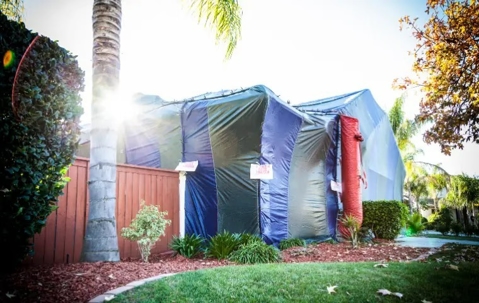How Long Does Termite Fumigation Last?
Dealing with a severe pest infestation in your South Florida home? Tent fumigation might be the solution you need. It's especially effective against those stubborn termites who love burrowing deep into your home's structure.
But don't worry. After fumigation, your home is meticulously aired to ensure it's safe and free of chemical traces. Imagine returning to a pest-free, secure, and healthy home – that's what tent fumigation can offer.
Key Takeaways
- Termite fumigation effectively eradicates severe pest infestations within buildings, ensuring a comprehensive solution to pest control challenges.
- The fumigation process typically spans several days and an additional period for thorough aeration to ensure safe re-entry.
- After fumigation, rigorous safety procedures are implemented to ensure the environment is entirely habitable and free from fumigant residues.
How Long Does Termite Fumigation Last?
Generally, the tent is kept up for 24 to 72 hours.. This period allows the fumigant gas to penetrate the infested area, deeply seeping into the entire structure.
However, the duration of fumigation mainly depends on various factors, which determine the time required for effective treatment through fumigation.
Size of the Structure
The larger the building, the longer it may take to fumigate and eradicate all termites.
Severity of Infestation
A heavier termite infestation requires longer fumigation times to ensure complete extermination of all termites, including deeply nested colonies.
Type of Termites
Different termite species may require varying treatment durations due to their unique nesting and feeding habits.
Type of Termite | Treatment Consideration |
Drywood Termites | Requires thorough treatment within wood structures. |
Subterranean Termites | They may need additional methods due to their habitat in the soil. |
Fumigant Concentration
The amount and type of fumigant used can influence the duration; higher concentrations may act faster but require careful handling and longer post-treatment aeration times.
Environmental Conditions
Factors like temperature, humidity, and wind can affect how the fumigant disperses and penetrates, potentially altering the necessary duration.
Building Materials
Certain materials, such as thick wood or dense construction, might absorb fumigants differently, affecting the length of the fumigation process.
Preparation and Sealing Quality
Proper preparation and sealing of the structure ensures the fumigant is contained and effective, influencing the overall duration of the treatment.
How Effective Is Termite Fumigation?
Termite fumigation is recognized as a highly efficient solution for pest infestations by pest control services, offering several key advantages:
- Deep Penetration: The fumigant reaches pests hidden in crevices and hard-to-reach areas in attics, closets, and crawl spaces.
- Colony Eradication: Unlike surface treatments, fumigation can eradicate the active termite colony, including the queen and larvae.
- One-Time Comprehensive Treatment: A single fumigation session is often sufficient, whereas other methods may require multiple applications.
Comparison of Fumigation with Alternatives
When considering termite treatment options, you should understand how different pest control treatment methods compare to fumigation.
Aspect | Termite Fumigation | Bait Stations | Liquid Treatments |
Effectiveness | Highly effective, eradicates entire colonies. | Good for control, slower action. | Effective, less so for deep infestations. |
Application | One-time treatment. | Multiple installations needed. | May need multiple applications of pesticides. |
Invasiveness | High–premises evacuation required. | Low – minimal disruption. | Moderate – may involve drilling. |
Duration | Long-lasting, several years. | Long-term with monitoring. | Several years, soil-dependent. |
Cost | Higher upfront, cost-effective long-term. | Lower initial, ongoing costs. | Moderate, varies with treatment scope. |
Suitability | Best for severe, widespread infestations. | Early-stage infestations, preventive. | It is good for subterranean termites and perimeter defense. |
What Post-Fumigation Considerations Should You Know?
After termite tenting, ensure your homes are safe and clean before moving back in.
Post-treatment Inspections
- Regular Monitoring: Schedule routine inspections to detect any signs of pest resurgence.
- Preventive Measures: Implement strategies to prevent future infestations, such as environmental modifications.
Aeration and Re-Entry
After the fumigation process, ensuring your home is safe for re-entry is essential. Here are some critical steps:
- Ventilation: Once the tents or tarps are removed, thoroughly ventilate the home to remove residual fumes.
- Safety Check: The fumigation company will test the air quality to ensure it’s safe for re-entry.
- Re-entry Time: This varies based on the chemicals used and the home’s size, but it is typically 24 to 72 hours.
Cleaning and Maintenance
Once it’s safe to re-enter, a thorough cleaning is necessary for household items. Here’s a quick checklist:
- Surface Cleaning: Wipe down all countertops, tables, and surfaces.
- Launder Items: Wash all linens, bedding, and clothing left during fumigation.
- Floor Cleaning: Sweep and mop the floors.
Regular maintenance is crucial for future pest prevention. Here’s a quick checklist:
- Seal Entries: To deter pests, close gaps, entry points, or cracks.
- Reduce Clutter: Keep your home tidy to eliminate potential pest-hiding spots.
- Proper Garbage Disposal: Dispose of trash promptly and adequately.
What Are Common Concerns on Termite Fumigation?
People often question the impact of the tenting process on health and the environment.
Safety Measures and Precautions
When it comes to fumigation, safety is paramount. Professionals adhere to stringent safety measures and precautions to ensure your well-being and the environment.
Communication Protocol
- Timeline of the fumigation process.
- Post-fumigation safety instructions.
- Adequate dissemination of warning signs.
- Secure sealing of the tent to prevent leakage.
- Proper ventilation of the structure after fumigation.
What Is the Role of A Professional Pest Control Company?
Understanding the pivotal role of professional pest control experts is vital to the specifics of termite fumigation.
Warranty Assurance
Professional pest control companies offer extensive warranties, ensuring long-term, termite-free conditions after the fumigation services.
Proactive Termite Management Program
These pest control professional exterminators proactively prevent infestations with regular inspections and treatments, safeguarding your property against future termite threats.
Follow-Up Inspections
An annual professional termite inspection is crucial for early detection and continuous protection against termites, which can help maintain the integrity of your property.
